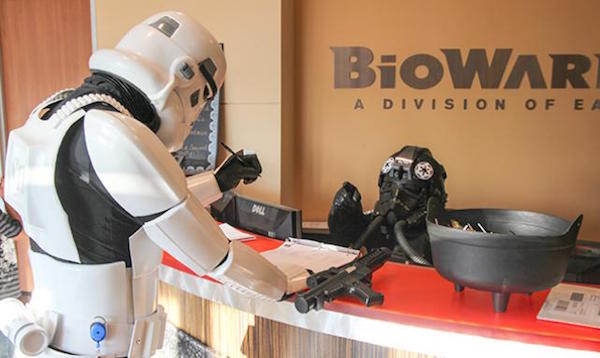
Electronic Arts (EA), the seventh top-producing gaming company in the world, has studios across four of the seven continents, including several here in Austin.
Through acquisitions, expansions and relocations, EA's presence has continued to grow in Austin over the years — especially for their BioWare, EA Mobile, EA SPORTS, Worldwide Customer Experience and IT teams. We connected with two members of their local team to see what they look for in potential candidates and hear some advice for techies trying to break into the multi-billion dollar gaming industry.
Here's what senior recruiters Travis Dungan and Shannon Schlothauer had to say.

Built In: What roles do you often hire for?
Schlothauer: BioWare develops high-quality console, PC and online role-playing games that are emotionally engaging to the players. To create and deliver these unforgettable games, we look for talented individuals within art, design, development, production and quality assurance. At that studio, we’re currently looking for roles like character and concept artists, graphics and gameplay programmers, lead level and lead systems designers as well as quality analysts.
Dungan: On our tech ops team, we build the infrastructure that makes playing our games online possible. So we hire systems engineers, DevOps engineers, network engineers, database engineers, infrastructure architects, software engineers, security engineers, business analysts and program managers.
BI: What qualifications do you seek from interested candidates?
BI: Aside from technical skills, what other important characteristics do you look for in a candidate? Why?
Schlothauer: At EA, one of our core values is “passion” – so having a passion for games, no matter what role, is a must have quality for candidates. And of course, they have to have interest in the studio or role they are applying to. With so many other big studios out there, we want to know why they want to work with us. Even if you’re not an avid gamer, you have to be passionate about your work and the types of experiences we create for millions of people.
BI: What makes a good hire "good"?
BI: What importance do grades and education play?
Schlothauer: Education and grades play a role in hiring, but we also value the experience an individual is bringing to the table. For a graduate hire, grades, education and coursework play a larger part in hiring decisions given they traditionally have less industry experience. That being said, EA has a robust internship and graduate hiring programs as we value the future talent of EA. While grades and GPA matter to some extent, we still value actual industry experience.
For those entering the workforce this can come in the form of internships, company exposure and class projects. Also, related extracurricular activities such as hackathons or building an indie game on your own time are valued by hiring managers.
BI: When a candidate's experience is less than the requirements, what can they do or show to still be considered?
BI: What's an in-person interview like at EA games for a developer? Do you prep them at all in advance for one?
Schlothauer: It’s important to us that the candidate gets as much visibility as possible to what the role entails and the studio has to offer. Candidate preparation is always necessary. This allows you to set realistic expectations about the interview itself, the process, and when they can expect a decision to be made. Onsite interviews can average five to six hours and include lunch with the team.
Candidates work with our talent acquisition team to figure out interview details and travel arrangements if needed. We also make sure to send our candidates the interview schedules in advance, so they can research who they are meeting and prepare questions in advance.
A member of the talent acquisition staff will greet the candidate, show them the studio and spend about 10 or 15 minutes with them to answer any last minute questions before the interview starts. We also meet with the candidate at the end of the interview day for follow-up questions and to ensure the candidate had a good experience. Candidate experience is crucial to hiring top talent, so we make sure to provide as much detail and seamless process as possible.
BI: For someone trying to break into this industry, what do you suggest are the appropriate steps to take?




